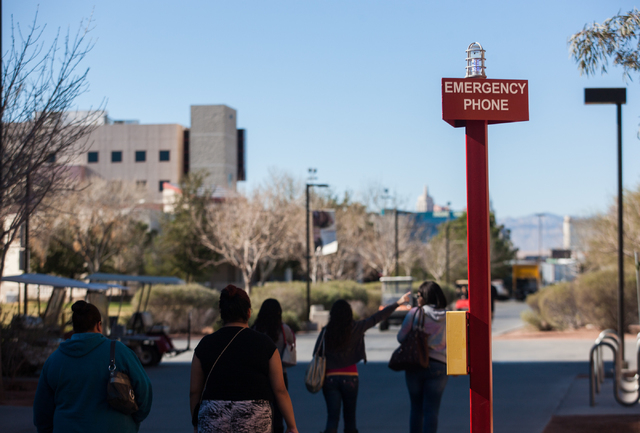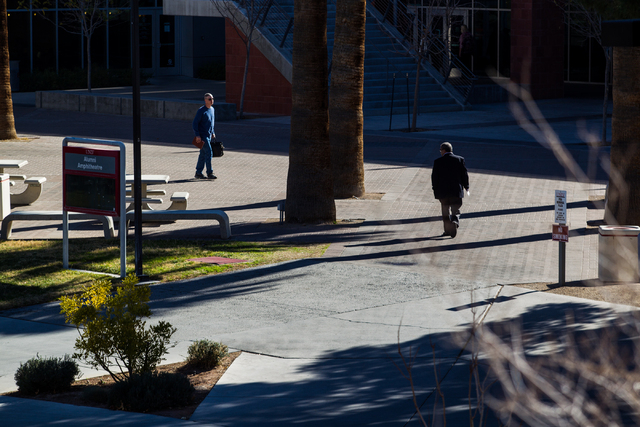Southern Nevada colleges report low levels of serious crime


Katie Sears knows that UNLV’s campus is not in one of the safest areas of the valley.
“Being a native, I know Las Vegas,” the 21-year-old senior said on Tuesday. “I think we are all kind of aware that something dangerous could happen.”
Colleges and universities that receive federal funding for financial aid are required to report certain crimes that happen on or around their campuses to the federal government under the Jeanne Clery Disclosure of Campus Security Policy and Campus Crime Statistics Act.
On Southern Nevada college campuses, forcible sex offenses are rare while liquor violations are more common, according to the most recent reports made under the act.
From 2010 to 2012 at the University of Nevada, Las Vegas, three forcible sex crimes were reported, according to its 2013 Annual Security Report. Two of the reported sex crimes at UNLV happened on campus while the third took place on non-campus building property.
The College of Southern Nevada reported two forcible sex offenses on campus in 2011, according to its report.
Nevada State College didn’t report any forcible sex offenses from 2010 to 2012, according to its report.
It’s important that students, staff and faculty report such crimes, said officer Paul Velez, spokesman for the UNLV Department of Police Services. Students can do so anonymously to a designated campus security authority, who are mostly officials who hold student services positions.
“We won’t know about it unless it’s appropriately reported,” Velez said last week.
Campus police work closely with UNLV’s Women’s Center, the Office of Student Conduct, and student counseling and psychological services, Velez said. Police Services and the Metropolitan Police Department work to track crimes near campus.
The campus police department also has Rebel Roundtables, a monthly forum where officers provide information to students on various topics such as sexual assault and domestic violence. Beginning in the fall, the agency also will have meet-and-greet tables inside the student union twice a month.
It will provide crime intervention information and will continue to develop relationships with students so they feel comfortable reporting a crime, Velez said.
“They need to help us help them,” said Darryl Caraballo, chief of police for the College of Southern Nevada.
One of two forcible sex offenses at CSN’s Cheyenne campus in 2011 happened when a female was walking to her car at night and was attacked by a male suspect as she was getting into her vehicle, Caraballo said.
The second incident was similar and also happened at the Cheyenne campus.
“It’s very rare on our campus,” Caraballo said. However, “We are so open and inviting, that bad elements are also going to come here.”
UNLV, one of the state’s largest college campuses with residential housing, reported the highest number of liquor law violations and drug violations, with the majority of them occurring on campus. From 2010 to 2012, there were 119 arrests for such violations. Velez said drinking is part of college culture, and for many of the students living on campus, it’s the first time they’re away from home.
“They are not under the thumb of their parents and they are experimenting,” he said.
Smaller campuses, such as Nevada State College, are more sedate.
The school only has about 3,400 students and there are no dormitories on campus, said Spencer Stewart, associate vice president of college relations, explaining why crime rates may be lower at the Henderson campus.
The city of Henderson also has been ranked as one of the safest cities across the country by online publications and websites such as Law Street, Stewart said.
The few crimes reported by the state college include a robbery, aggravated assaults, burglaries and vehicle thefts. However, none of those crimes happened on campus, but on surrounding public property.
“We are a campus that is still evolving,” Stewart said last week. “We do not have those amenities yet that would perhaps warrant the potential for crime. Crime rates will go up when you have a large number of people living in close proximity.”
Nevada State College doesn’t have a police department, but it pays $330,000 annually for security services.
There’s a security officer in each campus building, said Imad Mehanna, the Henderson campus’s director of facilities management and planning.
The college also works with the Henderson Police Department to track crimes that happen near campus.
The college is considering partnering with CSN or UNLV to have two full-time police officers on campus. That would cost Nevada State College an estimated $170,000.
“We are always striving and looking for alternatives on all things that can enhance safety on campus,” he said.
Reporter Yesenia Amaro can be reached at (702) 383-0440, or yamaro@reviewjournal.com.












